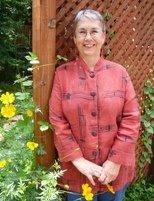What was I thinking titling my poetry class Ekphrastic? Obscure.
From the Greek.
Not a welcoming word.
Not a welcoming word.
It drew five
participants, but one dropped out after being told it was not, as he thought, a
class on the geology of the southwest. It was poetry based on art. So, I had an
amazing class of four.
The thing I love about a tiny group is that we can meet in
the intimacy of Ghost House, the first adobe structure build on the property in
1888.
Through the double cranked out windows we can see the old
rustler cottonwood, the “hanging tree” turning golden. Farther out, the mesa which
is surely about to wear out its ancient name: Pedernal.
 The other thing I love is that with four writers, five with
me, there’s room to notice all the other invisible spirits who want to hang
around and have their say: living and passed -- a wife, a son, a dog almost
lost to depredation. We welcomed in van Gogh, an artist named Veeneman, songster Donald Fagen, O’Keeffe, of course, and a farm in Namibia called Damara.
The other thing I love is that with four writers, five with
me, there’s room to notice all the other invisible spirits who want to hang
around and have their say: living and passed -- a wife, a son, a dog almost
lost to depredation. We welcomed in van Gogh, an artist named Veeneman, songster Donald Fagen, O’Keeffe, of course, and a farm in Namibia called Damara.
The room fills up with newness. The daily grind we left
behind recedes. Language powers us up beyond the tiring talking points lodged
in our heads from dogged media.
These writers were so creative in that space I almost
decided against a field trip to a gallery in Los Ojos. But the day was ashine
with Aspen and Chimisa, so we went. One the way, a flock of Churro sheep slowed
us down. The border collies and horse-mounted shepherds minded hundreds of woolen
ungulates waving down and up, down and up, Highway 84. Other drivers turned
around. We took turns jumping out the truck to get a closer look. That day in Rio Arriba County something was happening and we were there to see it, smell, and
feel it -- the October ritual of guiding sheep down out of their summer
highlands.
When the flock turned left and quilted down toward the
valley, we were suddenly less interested in a gallery. Anyway, it was closed.
Tierra Wools was open, though, and we went in and marveled at the brilliant
hues of wool, the looms. We loved the women with their needles clicking,
talking, laughing, by the fire as though it was an ordinary autumn day.
Nothing during the week was very ordinary, especially the
poems, a few of which I am happy to share with the wider world. With permission, here is
a sampling.
GEORGIA
Georgia
O’Keeffe looked at Pedernal
Everyday
even if
Only
in her mind because
Really
the mountain dominated her life,
Gave
her
Artist
brushes in hand and paint.
Charles E. Colson
TRANSFORMATION
We saw a bobbing sea of walking wool,
A mass of undulating fleece that blocked
Our way. Police directed, traffic stopped,
A cowgirl waved, and dogs insisted on obedience,
Until the crowd of cloud-hued sheep was gone.
Proceeding on our way, we came upon
A shop, where crafty weavers worked their magic.
From skeins of yarn a colour wheel unspooled.
They warped and weft it by design and now
It’s done. Now all that wool’s for walking on.
Dianne Hubbard
THE ROAD TO ABILENE
(from a series of
linked poems entitled HWY 84)
A gentle turn north
becomes the road to Abilene, I pass a
Business man, a Sales
man, a Willy Loman, piloting his sixty-grand Ram
I feel his lurking
quota, his debts, a desperate book of business hanging over his head
Like Gollum, failing,
greedy, grabbing for that one ring of power
Even a sucker, a
rube, a mid-level manager can sense his anger and his hangover
Now I pass trooper
lights, stopped and popping like the Fourth of July
Every trooper’s
witnessed desperation, but this one’s gone and he can’t know what I know I’ve
done
Gary Alexander
The Woman, the Horse
and the Sheepdog
Warmly
dressed on a light snowy day
A
woman stares at something beyond, something
we cannot see
and can only speculate has something to do with
the sheep behind them –
Behind
the woman,
behind the horse and
behind the
sheepdog.
The
woman, the horse and the sheepdog
A
unity of being in three parts
A
perfect Trinity.
As
she looks, so then does the horse move
sensing her gaze or the
imperceptible
pressure of reign and flexed
leg
muscles.
And
the dog, curling around dangerously close to iron
Hooves,
follows the horse,
following the
woman
following the gaze.
This
is harmony
the woman,
the horse,
and
the sheepdog
Can
we respond to a passion more felt than seen,
more intuited than understood?
Can we hear it,
feel it,
trust it?
Do
we know what it even is
And is it a part of us,
are we a part of it?
Not
a thing obtained
But
one nurtured,
found
within and cultivated.
To
follow a gaze,
To respond to a gentle pressure,
To trust the one
we are following,
The
woman,
The horse,
And the
sheepdog.
Scott Herren






